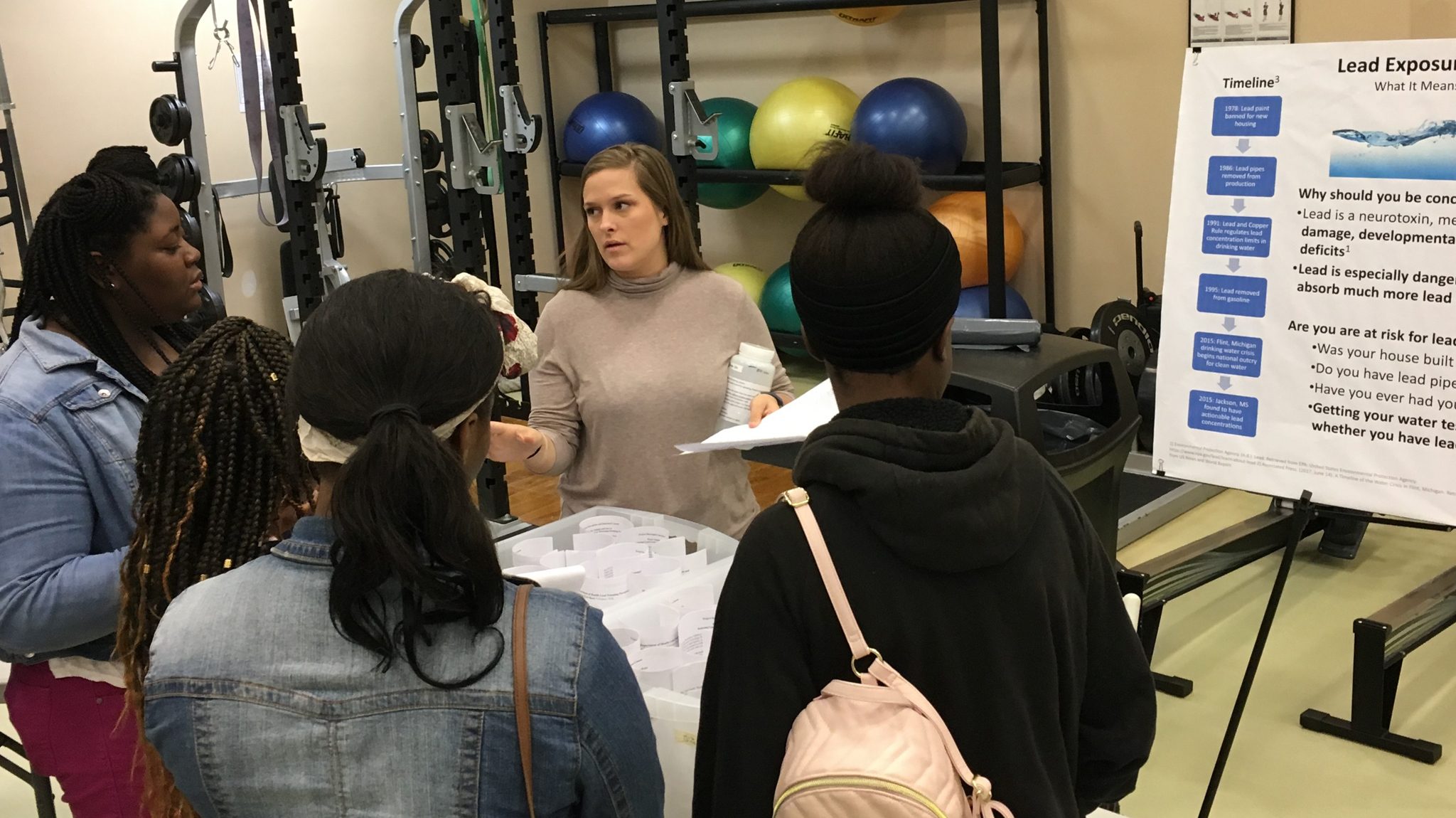
UM student Alex Fratesi (center) conducts a water sample training with youth from the Tri-County Workforce Alliance at a Health Research and Career Fair at North Sunflower Medical Center in Ruleville. Submitted photo
OXFORD, Miss. – Public service has always been an integral part of the lives of University of Mississippi faculty, staff and students. For years, academic units and administrative officers have been partnering with Mississippians across the state to improve living conditions in their communities.
As a new academic year begins, university faculty, staff and students are seeking mutually beneficial partnerships to advance community development and spur hands-on learning.
The university’s Center for Population Studies, McLean Institute for Public Service and Community Engagement, and M Partner program, an initiative housed at the McLean Institute, are among university units working on these collaborations. Here is a brief description of what each organization has done recently and how to pursue possible partnership opportunities through them:
Center for Population Studies – The CPS educates, conducts research and engages in outreach to address important population issues, especially in the realms of community and health. It houses the State Data Center of Mississippi, Applied Policy and Community Research Laboratory and the academic minor program in Society and Health.
Collaborating with the National Sea Grant Law Center, School of Pharmacy Department of BioMolecular Sciences and School of Engineering, it has been involved with the Drinking Water and Lead Contamination Project. By spring 2019, the team had partnered with eight community organizations to hold educational and testing efforts from more than 200 homes across 16 counties.
In each case, participants were notified by mail of the sampling results, and when appropriate because of heightened water concerns, provided with water filters.
“We’re looking to partner with communities interested in water quality and health issues,” said John Green, CPS director and professor of sociology and anthropology. “To date, the team has focused on community-based approaches to testing for lead in drinking water in both the Mississippi Delta and Jackson areas.
“This has included partnerships with a wide range of organizations, including cross-fertilization with other UM-community initiatives, such as the Marks Project and James C. Kennedy Wellness Center, partnered for water quality study.”
To express an interest in partnering, email leadinwater@olemiss.edu.
Another of CPS’ major collaborative initiatives is New Pathways to Health and Opportunity. Working with the Aaron E. Henry Community Health Services Center, Dreyfus Health Foundation of the Rogos Institute, Mississippi Hospital Association Foundation and Tri-County Workforce Alliance, partners are providing assistance in communities in Sunflower, Bolivar, Coahoma, Quitman and Tallahatchie counties.
The initiative offers health career training and exposure to youth and young adults, school health councils, allied health professionals trainings, Dedicated Education Units and Community Health Worker trainings.
Additional programs emphasize connecting career exposure and workforce development programs to employers and job opportunities. Some of the participants have been involved in the lead project to advance their studies and hands-on experience regarding health.
McLean Institute for Public Service and Community Engagement – Six years ago, community members from Marks approached the McLean Institute about the possibility of developing a partnership with UM to support community and economic development efforts. The institute engaged faculty and staff from across campus, including the departments of African American Studies and Sociology and Anthropology, School of Education, Ole Miss athletics and members of the North Mississippi VISTA Project, which is also housed in the McLean Institute.
The Marks Project is a nonprofit organization that works with a number of towns in Quitman County –Marks, Lambert, Crowder, Darling and Sledge – to jump-start efforts focused on literacy, health, economic growth and more.
Anne Cafer is an assistant professor of sociology and anthropology who received funding through the McLean Institute’s Catalyzing Entrepreneurship and Economic Development initiative to support community-based research to support the Marks Project.
“For the past three years, we’ve had a variety of nutrition and hospitality management, sociology, health sciences and other students and others engage with community members through the Marks Project to conduct health screenings, health fairs in the high school and provide general nutrition and wellness education,” Cafer said. “The Marks Project is also partnering with Quitman County, Northwest and Coahoma community colleges to offer a variety of adult education and job training courses, including GED, basic computer skills, forklift training, screen printing and welding.”
Communities across Mississippi that need help are encouraged to reach out to see exactly what the university can offer them in terms of assistance, Cafer said.
“For the activities I’m involved in, I don’t have any requirements in what these communities look like,” she said.
The McLean Institute will be seeking additional host sites to join the North Mississippi VISTA Project. Host sites are nonprofit organizations or Title I School Districts committed to poverty alleviation.
To contact Cafer, call 662-915-5733, 402-417-6960 or amcafer@olemiss.edu.
M Partner – Launched in 2018, the program offers a framework for community and university representatives to work on priority projects in partner cities across the state. Inaugural M Partner communities are Charleston, Lexington and New Albany.
Last spring, 16 faculty members from a range of academic disciplines implemented M Partner priority projects as part of their teaching and research. These projects included social media campaigns to boost tourism, health and career fairs to encourage healthy lifestyles and introduce health professions to high school students, supporting the expansion of local farmers markets, and researching best practices to improve reading proficiency by third grade.
“As M Partner grows, it will reach a new partner community each year,” said Laura Martin, M Partner director and associate director of the McLean Institute. “This innovative new initiative is positioned to bring transformative results that will elevate quality of life in Mississippi, one community at a time.”
To learn more about M Partner, visit http://mpartner.olemiss.edu/contact/.